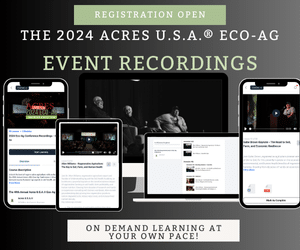Rick Clark is a fifth-generation farmer based in Warren County, Indiana, but he’s been spreading the no-till, organic gospel far and wide for the last few years. He gave a keynote address at the Acres U.S.A. Healthy Soil Summit back in the summer. And just this month he was a featured speaker at the Acres U.S.A. Eco-Ag Conference in Columbus, Ohio.
And if you’ve ever heard Rick speak, you know how much of an evangelist he is for soil health and ecological farming. His enthusiasm is infectious. He’s definitely not hiding his light under a bushel.
In fact, big food brands have started taking notice of Clark’s production methods. Rick was named Danone’s Sustainable Farmer of the Year in 2017. And Land O’ Lakes recently recognized his work with an Outstanding Sustainability Award.
So why is Clark getting this attention? Because he’s proving that an obsessive focus on soil health — and not just on yield — can work at a commercial scale.
His family has farmed near Williamsport, Indiana since the 1880s. Today, the family is producing organic corn, soybeans, wheat, alfalfa and more on 7,000 acres. Clark is quick to point out that they were, historically, among the worst offenders in terms of excessive tillage and toxic chemistry.
But over the last 15 years or so, that’s all changed. Today, Clark is proving that no-till organic production methods can lead to both a profitable business and a healthy, balanced ecosystem. Yes, that means no till, no pesticides, no herbicides, no synthetic fertilizers. But it isn’t just about what he isn’t doing. Clark is also perfecting the craft of cover crops as well as the use of livestock within cropping systems. Clark says his strategy is to work with Mother Earth to create self-sustaining, closed loop ecological systems that are teeming with biodiversity. But he’s also obsessed with collecting data and using technology to his benefit. What he’s not obsessed with is yield. To him, it’s almost a five-letter word. The most important consideration, for Clark, is the long-term health of his land. And his vision might just be the future of agriculture.
To find our more about Rick Clark, visit www.farmgreen.land.

